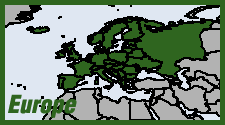 Two bills to legalize "recreational" cannabis have been introduced in Portugal—a country that already has a thriving medical marijuana industry, and a "depenalization" policy for personal possession that has been hailed as a success by reform advocates across the world.
Two bills to legalize "recreational" cannabis have been introduced in Portugal—a country that already has a thriving medical marijuana industry, and a "depenalization" policy for personal possession that has been hailed as a success by reform advocates across the world.
Portugal suffers from a strange contradiction. Despite being Europe's second largest producer of legal cannabis for the global medical industry—and despite a tolerant decriminalization policy—personal use and possession remain technically illegal, outside of a tightly regulated medical program. Now, two initiatives to change that are under before the Iberian country's parliament.
The Left Bloc (BE) and People-Animals-Nature (PAN) party each submitted their bills this month to the parliament, known as the Assembly of the Republic. As Portugal News Online notes, both measures are currently under debate.
Cautious language
The BE version, entitled "Legalizing Cannabis for Personal Use," was introduced Jan. 12, calling for regulated cultivation and marketing of cannabis for "non-medicinal use." The statement of intent submitted with the legislation reads: "The main objective of responsible and safe legalization of recreational cannabis should always be the reduction of problem consumption, the effective fight against drug trafficking and associated crime."
This version would allow adults to cultivate up to five plants for personal use. Tax revenues from legal sales would be equally divided between drug treatment programs and funding for the country's National Health Service. Retail outlets would be nationally registered, with sale of alcohol prohibited at such establishments. Cannabis edibles and "synthetic" marijuana products would both be prohibited, as would advertising and promotional coupons and give-aways.
The PAN version, introduced Jan. 7, is entitled "Regulating Adult Use of Cannabis." It similarly cites as its aim the "protection of public health and safety." It describes the goals of a regulated cannabis market as "to protect people from the risks of illegal trade and drug-trafficking, as well as the health, social and economic consequences that the irresponsible and uninformed use of psychoactive substances can have on society."
The PAN bill would allow personal cultivation of up to six plants, but it includes more measures to appease the fears of conservatives, such as barring consumption in the workplace or medical facilities, and prohibiting sale to those with a history of "mental illness." Tax revenues from legal sales would likewise go to drug treatment and prevention programs. The bill would require the government to set the price of cannabis "lower than the average prices charged on the illegal market."
Both bills would set the age of legal sale at 18, and bar use in proximity of youth-oriented places such as schools or playgrounds.
A vote on either of these bills could be imminent. However, even with such cautious language, gaining enough support from other parties for passage could be difficult. Politics in Portugal has long been dominated by the center-left Socialist Party and center-right (despite its leftish-sounding name) Social Democratic Party. The latter may be presumed to oppose any legalization measure, while the Socialist Party has indicated that it will abstain from a vote on the bills. The Portuguese Community Party and right-populist People's Party are also said to oppose the proposals.
As Marijuana Moment website notes, Socialist Party lawmaker Jamila Madeira told Lisbon's Publico newspaper that he considers legalization a "natural evolution" in drug policy, but nonetheless said the government must take more time to "evaluate some of the critical points in the control of consumption" among young people.
'Depenalization' and the medical industry
In 2001, Portugal adopted a "depenalization" policy for personal possession of personal quantities of all illegal drugs. This has been widely hailed as a success by drug policy reform advocates across the world—indeed, looked to as a model.
There are, however, still possible consequences for personal possession and use. As a primer by the Drug Policy Alliance explains, those found in possession of personal-use quantities of any illegal drug—including cannabis—are no longer arrested, but ordered to appear before a local "dissuasion commission," made up of officials from the legal, health and social service spheres. The commission makes a judgment on whether the individual is addicted to drugs, and may refer the offender to a "voluntary" treatment program, or impose an "administrative" fine or other sanctions.
Portugal has a fast-growing legal cannabis cultivation industry for the international medical market—the third biggest in the world after the United Kingdom and Canada. In a deal just announced this week, a joint Canadian-Israeli venture is investing 16 million euros in local company Sabada Portugal to cultivate high-grade cannabis on four hectares at Campo Maior in the country's southern Alentejo region. Such enterprises are licensed and overseen by the National Authority of Medicines and Health Products (INFARMED).
But a law permitting domestic use of medical marijuana was only passed last June—a legislative effort likewise spearheaded by the Left Bloc and PAN. But in a (successful) bid to win enough support for passage, it includes no provisions for personal cultivation.
Cross-post to Cannabis Now







Recent comments
5 weeks 15 hours ago
5 weeks 22 hours ago
8 weeks 1 day ago
9 weeks 22 hours ago
13 weeks 1 day ago
16 weeks 6 days ago
20 weeks 6 days ago
21 weeks 5 days ago
31 weeks 5 days ago
35 weeks 5 days ago